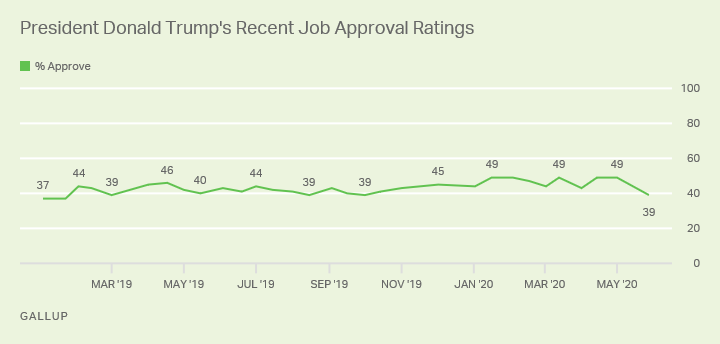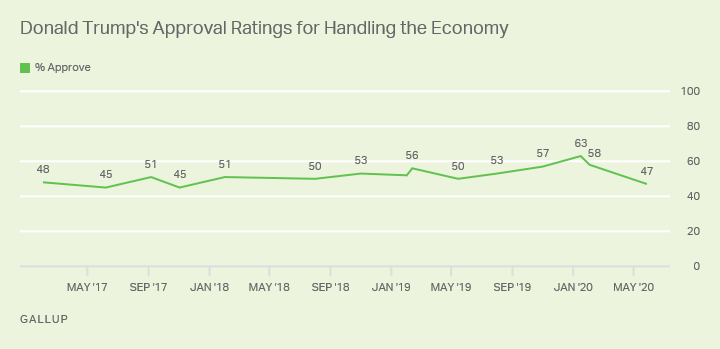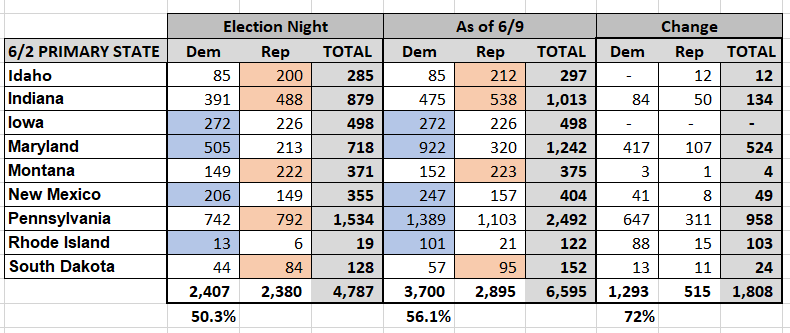
By Glynn Wilson –
For one of the fews times in Donald Trump’s presidency, his job approval rating has fallen below 40 percent, a harbinger of problems ahead in his drive for reelection in November that could make a second term “unlikely,” according to Gallup. Satisfaction with how things are going in the United States is also the lowest in four years. But other survey research firms are warning of vote counting problems in November that could delay the results.
Americans’ satisfaction with the way things are going in the U.S. dropped 25 percentage points to 20 percent, a level last seen in 2017, according to the latest Gallup poll on the subject.
According to the latest Gallup poll on presidential approval, Trump’s job approval in the eyes of the American people has fallen to just 39 percent.

The latest surveys were conducted as the number of cases of the coronavirus continued to go up in the United States, key economists officially announced that a recession hit the country in February, and protests against police violence and for racial justice gripped the attention of the nation and the world.
“Trump’s comments and actions in response to the protests … including a vow to send U.S. military troops to cities to quell violent protests, were controversial,” Gallup says in its analysis in a bit of understatement. “The administration was widely criticized after police in Washington, D.C., used chemical irritants to disperse peaceful protestors from an area shortly before the president posed for photos in front of a nearby church.”
The protests are ongoing as health care providers continue to deal with the effects of the coronavirus pandemic and cities and states begin reopening the economy.
Trump’s latest job approval rating fell significantly among all party groups, Gallup reports. Now only 5 percent of Democrats approve of the job this president is doing, down nine points from the previous survey. His standing among independents is down seven points to 39 percent. Even his standing with Republicans also dropped seven percentage points, to 85 percent, the lowest it has been since September 2018.
Economic Job Approval Drops Below Majority Level
Trump’s job approval for dealing with the economy is also down to 47 percent overall, a decline from 63 percent in January and 58 percent in February. Approval of Trump’s handling of the economy had not been under 50 percent since November 2017, when only 45 percent of Americans approved.

Coronavirus Response
Americans are also increasingly critical of the president’s response to the coronavirus itself, according to Gallup’s latest findings. Only 42 percent of Americans approve of the way Trump has handled the pandemic, down from 50 percent in late April.
Foreign Affairs
On foreign affairs, only 41 of adults in the U.S. approve of Trump’s handling of it, seven points lower than the previous measure in February.
Gallup’s Implications
“Public anger over the Floyd killing and racial injustice more generally have proven to be a significant challenge for the president, in addition to the ongoing challenges for society and the economy arising from the coronavirus,” Gallup says. “His current level of approval would make another term as president unlikely, given the historical relationship between job approval ratings and incumbent reelection.”
There is still time for those ratings to improve and get back near the 50 percent level associated with incumbent reelection in the past, Gallup says, with five months to go before Election Day. “But (there is) also time for them to get worse and give the president even longer odds of winning a second term.”
November Voting Error Warning
As the Gallup report came out showing Trump’s public approval dropping, JMC Enterprises out of Louisiana issued an “early warning” report about the election in November, saying voting errors on Nov. 3, 2020 could turn into another long, drawn out recount situation much like Florida in the Bush v. Gore election of 2000.
“Imagine waking up the morning after Election Day without knowing who won the Presidential election,” JMC asks.
This did actually happen back in November 2000, when a series of reporting errors on Election Night eventually led to the infamous “Florida recount,” as a late evening lead by George W. Bush in that state rapidly disintegrated to less than a 1,000 vote lead in the early morning hours, thus causing Al Gore to retract his concession to George W. Bush. It also led to a massive recount effort that ended up before the U.S. Supreme Court, where a partisan five vote conservative majority ended up ruling in Bush’s favor.
“Such a scenario is not out of the realm of possibility this year unless one of the candidates can establish a clear lead in the Electoral College the first few hours after polls first close in Indiana and Kentucky,” JMC warns.
Voting Method Changes
Admitting that the way the 50 states conduct their elections has substantially changed since that infamous 2000 voting fiasco, when nearly everyone waited in line on Election Day to vote at their voting precinct with only a few people voting “absentee” because a valid reason was required for not being able to vote in person.
In 1980 California removed the “excuse requirement” for absentee voting, then in the late 1980s, Texas became the first state to offer in person early voting. In 1995, Oregon conducted its first “mail in” election. Louisiana also implemented in person early voting about 15 years ago in the aftermath of Hurricane Katrina, and it first took off during the 2007 statewide elections.
“Since then, numerous states have adopted one or a combination of these types of voting, and before the pandemic, only about 15 states (mainly in the Northeast and the South) still conducted elections the ‘old fashioned way’ with Election Day voting and an excuse required to vote absentee,” JMC reports. “The coronavirus pandemic has rewritten the election rules, however.”
Given concerns about proper “social distancing,” there have been consistent problems with states attempting to conduct primaries with Election Day voting.
“Of course, it doesn’t help either that to reduce the spread of infection, many voting precincts have been consolidated,” JMC reports.
Georgia Primary
Those Election Day problems showed up Tuesday in primaries across the country, especially in Georgia, where long lines to vote caused overnight counting problems as well.
While mail in balloting does eliminate the long lines at polling places (since, of course, you can “vote” from the convenience of your home), it is not necessarily a panacea for how to conduct elections, JMC says.
Changing to all mail ins is a significant “paradigm shift” for both voters and elections administrators, which means there needs to be “transition time” for voters and elections administrators to learn the “new system.” Mail in ballots don’t get counted as quickly as ballots cast on a machine, thus creating an element of delay to the final vote count.
A perfect example of the downside of mail in voting is California, where many prefer to vote by mail. In the March 5 presidential/congressional/legislative primary election, 5.8 million voted for President, but only 3 million — just over half of that vote — was counted by Election Night. The remaining 2.8 million votes took 7 weeks to count — so the last mail ballots for the March 5 primary weren’t counted until April 24.
California is not an isolated example either. When “Election Season” restarted last Tuesday on June 2, nine states held election contests, and there was a greater preponderance of mail in voting. While 4.8 million votes were reported on Election Night, the expansion of mail in voting, particularly in Maryland and Pennsylvania created a mountain of uncounted votes which are taking time to count. In fact, in the seven days since that election, an additional 1.8 million votes have thus far been counted.
Why would this delayed counting matter?
June 2 Primary Results by State

While many of the states on the June 2 primary are likely to be solidly for either Biden or Trump this November, it is also a fact that Pennsylvania (which Trump carried by 44,300 votes in 2016) expanded its mail in voting, and in the week since those ballots started to be counted, the 1.5 million votes counted on Election Night has increased to 2.5 million. Those 958,000 additional votes counted since Election Night were 68 percent Democratic.
“In other words,” JMC says, “it’s possible for multiple states on Election Night to have a substantial number of uncounted votes. And while the initial returns may show either Trump (or Biden) in the lead, those last minute mail in ballots could ‘flip’ the results.”
Georgia is another example. Trump carried Georgia by 212,000 votes in the 2016 presidential election and it is a state where in person early voting is popular.
“For this year’s primary just held last night, the 394,000 voting in person and 44,000 voting by mail in 2016 became 329,000 voting in person, while mail in voting increased to 1,190 million – a 27 fold increase in mail in voting. Since a mail in volume like this is far more than the Trump margin in 2016, counting those ballots could again make this an uncalled state for several days after Election Day.”
And what could happen in Georgia after Election Day could also be the case in “swing states” like Florida and Arizona, JMC says, which historically have had a substantial mail in voting population.
“Furthermore, with mail balloting being expanded this year in many jurisdictions, it is possible that every swing state may remain uncalled on Election Night as those votes are being tallied,” JMC says. “The coronavirus pandemic has almost instantly changed how Americans vote, and the likelihood of delayed counting from an expanded mail in vote volume means this presidential election may be more of an ‘Election Week’ than ‘Election Night’ (so) … it’s important to be ready for that likelihood.”













